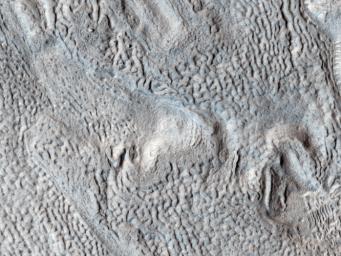
|
Ridges and Grooves That Wave and Buckle on a Valley Floor
- Click the image above for a larger view
- Full-Res JPEG (2560 x 1920) (905.8 kB)
- Full-Res TIFF (2560 x 1920) (14.8 MB)
Caption:

Map Projected Browse Image
Click on the image for larger version
Long linear ridges and grooves curve, wave, and buckle across most of this image. Here, as elsewhere on Mars, these linear ridges and grooves fill a valley floor, hence their name, "lineated valley fill."
Because these features are only found in valleys in the middle latitudes (30 to 60 degrees) of the Northern and Southern hemispheres, scientists had long suspected that they were associated with some ancient climate that had prevailed in that latitudinal band. Based on peering beneath the surface using radar, scientists now think that lineated valley fill is probably merely a rocky veneer atop a glacier of nearly pure ice! The rocks that make up the linear ridges and grooves were oriented by the ancient flow of the glacier underneath.
Background Info:
HiRISE is one of six instruments on NASA's Mars Reconnaissance Orbiter. The University of Arizona, Tucson, operates the orbiter's HiRISE camera, which was built by Ball Aerospace & Technologies Corp., Boulder, Colo. NASA's Jet Propulsion Laboratory, a division of the California Institute of Technology in Pasadena, manages the Mars Reconnaissance Orbiter Project for the NASA Science Mission Directorate, Washington.
Cataloging Keywords:
| Name | Value | Additional Values |
|---|---|---|
| Target | Mars | |
| System | ||
| Target Type | Planet | |
| Mission | Mars Reconnaissance Orbiter (MRO) | |
| Instrument Host | Mars Reconnaissance Orbiter | |
| Host Type | Orbiter | |
| Instrument | High Resolution Imaging Science Experiment (HiRISE) | |
| Detector | ||
| Extra Keywords | Color, Map, Radar | |
| Acquisition Date | ||
| Release Date | 2013-04-10 | |
| Date in Caption | ||
| Image Credit | NASA/JPL-Caltech/Univ. of Arizona | |
| Source | photojournal.jpl.nasa.gov/catalog/PIA17880 | |
| Identifier | PIA17880 | |
